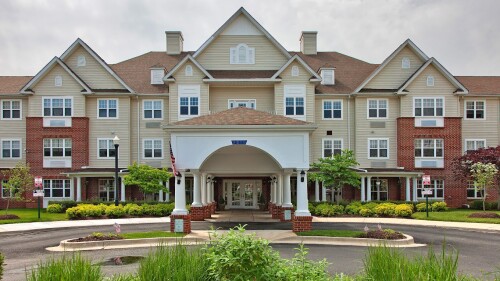Net Zero
In 2022, Philadelphia-based development firm Post Brothers bought two office buildings on Connecticut Avenue in Washington, D.C., with plans to convert them into approximately 530 residential units. Despite the site’s proximity to Dupont Circle and a coveted residential area, assembling a viable capital stack proved more challenging than anticipated. Ultimately, a $465 million Commercial Property Assessed Clean Energy loan from Nuveen Green Capital in December of 2025—billed as the largest ever originated under the program—made the conversion possible.
FORUM, a life sciences building developed by Lendlease, is the first purpose-built life sciences building in Boston Landing, a mixed-use district in the city’s Allston-Brighton neighborhood. Targeting LEED Platinum, the recently opened building employs numerous strategies that enable companies to meet stringent regulatory requirements, reduce their carbon footprint, and achieve net zero operations.
In late 2025, the ULI Randall Lewis Center for Sustainability in Real Estate convened a series of roundtables with sustainability leaders to explore the industry’s perspective on top global priorities in 2026. Roundtables consisted of members of the ULI Americas Sustainable Development Council, the ULI Asia Pacific Net Zero Council, the ULI Europe Sustainability Council, and sustainability-oriented committees of District Councils from ULI San Francisco, ULI New York, ULI Los Angeles, ULI Singapore, and ULI Philadelphia.
Since Microsoft established its headquarters in Redmond, Washington, in 1986, the company’s campus has grown from four buildings to more than 100. The East Campus Modernization Project is the latest addition: replacing several older structures with ones designed to meet the demands of the modern hybrid workplace—and embody the company’s commitment to both employee well-being and environmental stewardship.
Within the next 50 years, Earth will become a planet of cities. From São Paulo to Shanghai, Lagos to Los Angeles, today’s cities are no longer just places where people live. They are the active ingredient shaping how humanity evolves, how we work, how we connect, and how long we may ultimately thrive as a species. Arguably, few organizations are better positioned to contend with the challenges of a fast-urbanizing world than ULI.
With society and the real estate industry significantly behind on achieving the targets set in the Paris Agreement, and worsening affordability in Europe’s housing, ULI Europe’s C Change for Housing program has launched a landmark interactive systems map and companion report to help the real estate industry identify, co-create, and scale the solutions needed to decarbonize existing and future affordable housing.
The ongoing challenges in decarbonizing skyscrapers, warehouses, apartments, and myriad other types of buildings were a key topic during ULI’s 3rd Real Estate Developer & Utility Convening on September 22—part of Climate Week NYC, the largest climate conference outside of the United Nations’ COP.
ULI’s Global Sustainability Outlook, launched in 2021 by the Randall Lewis Center, has become the organization’s annual barometer on the sustainability topics shaping real estate and land use. Each year, the report distills insights from global industry leaders to identify the top issues most likely to influence strategic decision-making in the year ahead and beyond.
Dedicated fund structured as a low-interest revolving loan facility
Given the pressing challenges facing real estate globally on advancing building decarbonization, ULI is honored to announce the eight District and National Councils selected to participate in the fifth Net Zero Imperative (NZI) Cohort, joining nearly 30 global communities that have engaged with the program to date. NZI is a multiyear initiative to accelerate decarbonization in the built environment and is a significant aspect of ULI’s work to advance its net zero mission priority.















